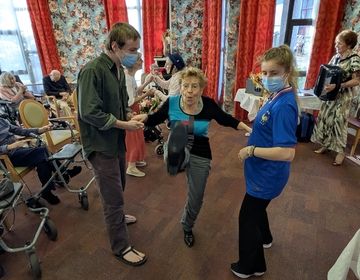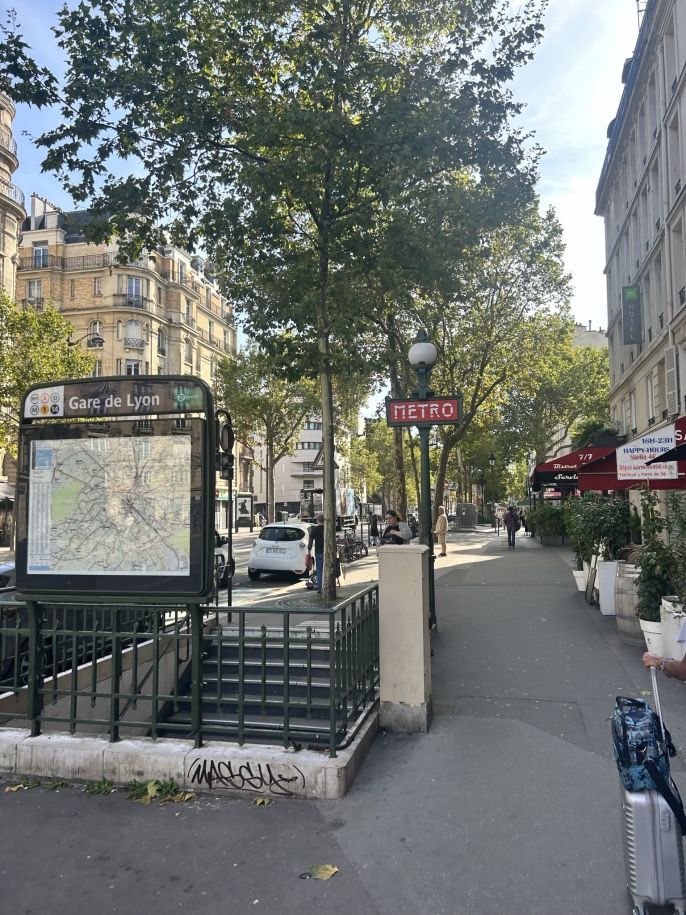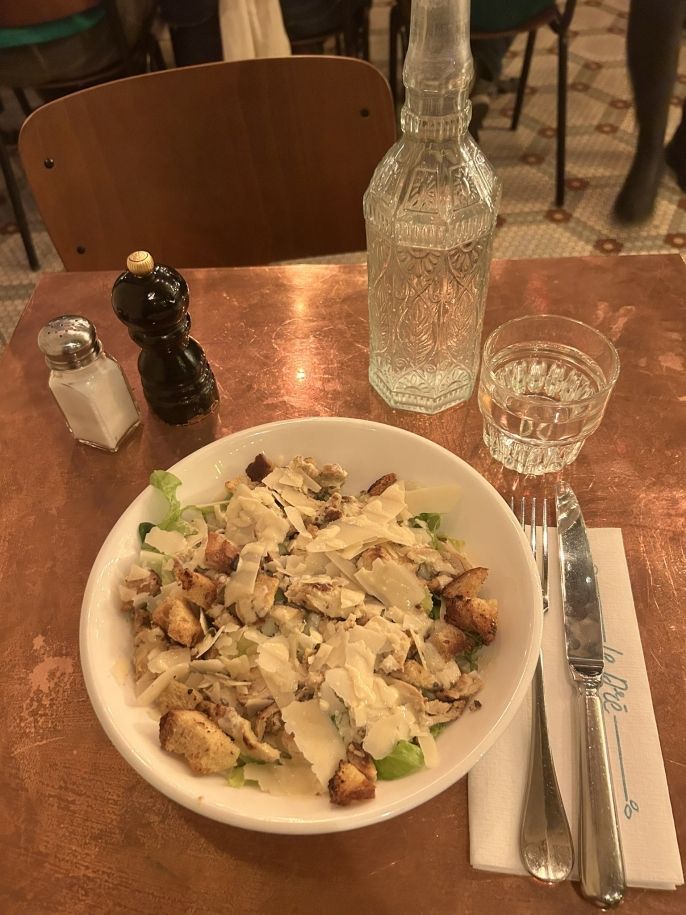Paris Survival Guide
By: Josie Stephens
Ordering food/drinks:
Je voudrais [juh voo-DRAY] - I would like…
Un/une [uh]/[oon] - one/a
Une carafe d’eau [oon CAH-raf doe] - (free) tap water jug
Une bouteille d’eau [oon boo-TAY doe] - (paid) bottle of water
Une verre d’eau [oon ver doe] - (at a bar) a glass of water
Un bière [uh bee-AIR] - a beer
Vin blanc [vaw blaw] - white wine
Vin rouge [vaw rooj]- red wine
Sans [saw] - without
Avec [ah-VEK] - with
Par carte [par cart] - (paying) by card
L’addition [la-di-SION] - the check
Manger [mahn-JAY] - to eat
Boire [bwar] - to drink
Un boisson [uh bwah-SUH] - a drink
La nourriture [la ner-i-CHUR] - the food
Je prends… [juh praw] - I will drink…
Gratuit [grah-too-EE] - free
Aussi [oh-SEE] - also
Speaking in public:
S’il vous plaît [see voo play] - please
Merci [mer-SEE] - thank you
Merci beaucoup [mer-SEE bow-KOO] - thank you very much
De rien [deh ree-UH] - you’re welcome
Pardon [par-DOE] - (trying to pass by someone) pardon
Excusez moi [ex-CUZE-eh mwah] - (to ask a question) excuse me
J’ai besoin d’aide [jay bez-WAH ded] - i need help
Où est… [oo ay] - where is…
J’ai une question [jay oon kehst-UH] - i have a question
Ici [ee-SEE] - here
Oui [wee] - yes
Ouais [way] - yeah
Non [nuh] - no
Greetings:
Bonjour [bow-JURE] - saying hi in the morning/afternoon
Bon journée [bow jure-NAY] - saying goodbye during the day/afternoon
Bon soir [bow swah-r] - saying hi in the evening
Bon soirée [bow swah-RAY] - saying goodbye in the evening
Bonne nuit [bone new-EE]- goodnight (only when going to sleep)
Travel:
Le gare [luh gar] - train station
Le métro [luh met-RO]- métro/subway
Le train [luh tren] - train
Une billet [oon bee-YET] - ticket
Cultural notes:
INSTEAD OF 911 DIAL 112!!
Clubs open very late at night and stay open very late at night (aka early in the morning)
For certain clubs you need cash to enter
For a lot of clubs you need to dress up with a dress and heels ideally (Try not to seem American or they might not let you in. Don’t go in a big group and don’t let guys in your group or you risk not getting in).
People eat dinner a little later than in the US
They spend a lot of time eating and drinking and chatting at dinner. Therefore, the waiter service tends to be slower.
You usually have to ask to get the check, they won’t just bring it
Sometimes you pay somewhere up front after the meal, not necessarily at your table
As with all of Europe, pickpocketing is very common. Keep your bags in front of you. A technique I use to avoid being pickpocketed is walking really fast and always being aware of your surroundings in public.
When on the escalators, stand on the right side if you’re standing still, but walk on the left side if you’re going to walk like they’re stairs.
No tips at all
It’s technically illegal to drink in public, but unlike the US, in actuality, you won’t get in trouble at all for drinking in public unless you’re being rowdy or if you’re a danger to yourself and others. You can have open bottles in front of cops and they don’t care (but better to avoid it in front of them I suppose).
People do dress nicer on a daily basis even for everyday things. You can obviously wear whatever you want as long as you’re covering your privates, but I personally felt uncomfortable wearing really cropped shirts or short shorts because pretty much no one does.
The culture is overall more quiet. Don’t talk too loud on the streets but especially not in the metro or in restaurants. Just match the volume of the locals (not other foreigners because they often speak too loud too).
When meeting a local in a friendly setting (not a total stranger), two cheek kisses is the custom instead of a hug or a handshake. One kiss on the left cheek, then switch to the right. It’s not an actual kiss with the lips, more of just a pressing together of your cheeks while making the kissing sound. Two men will typically go for a handshake instead, but if it’s a man and a woman, it’s the cheek kisses, and if it’s two women it’s the cheek kisses.
You can get into a lot of paid events for free or a discount with a student ID (or sometimes even if you’re just under 26).
Related Posts

Paris vs. Nice: Where Should You Study Abroad?
Choosing between Paris vs. Nice for your study abroad adventure is a dream dilemma – do you want to live in France's iconic capital city or it’s sunny Mediterranean city... keep reading

At Home In France
When I came to Rennes for my study abroad, I thought my biggest lessons would come from my university classes—grammar, vocabulary, literature, all that. But honestly, some of the most... keep reading

Volunteering in Rennes
“You better hurry up, or we are going to get a timer.” A word to the wise: if you are wanting to volunteer at a retirement home in France, make... keep reading


